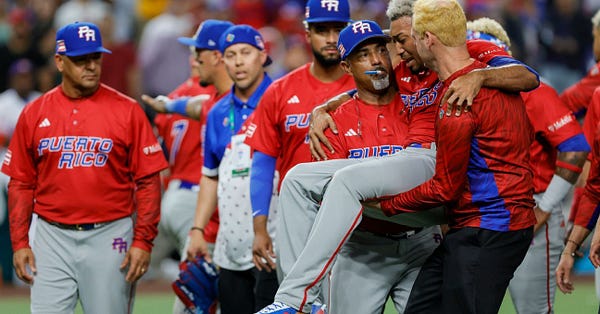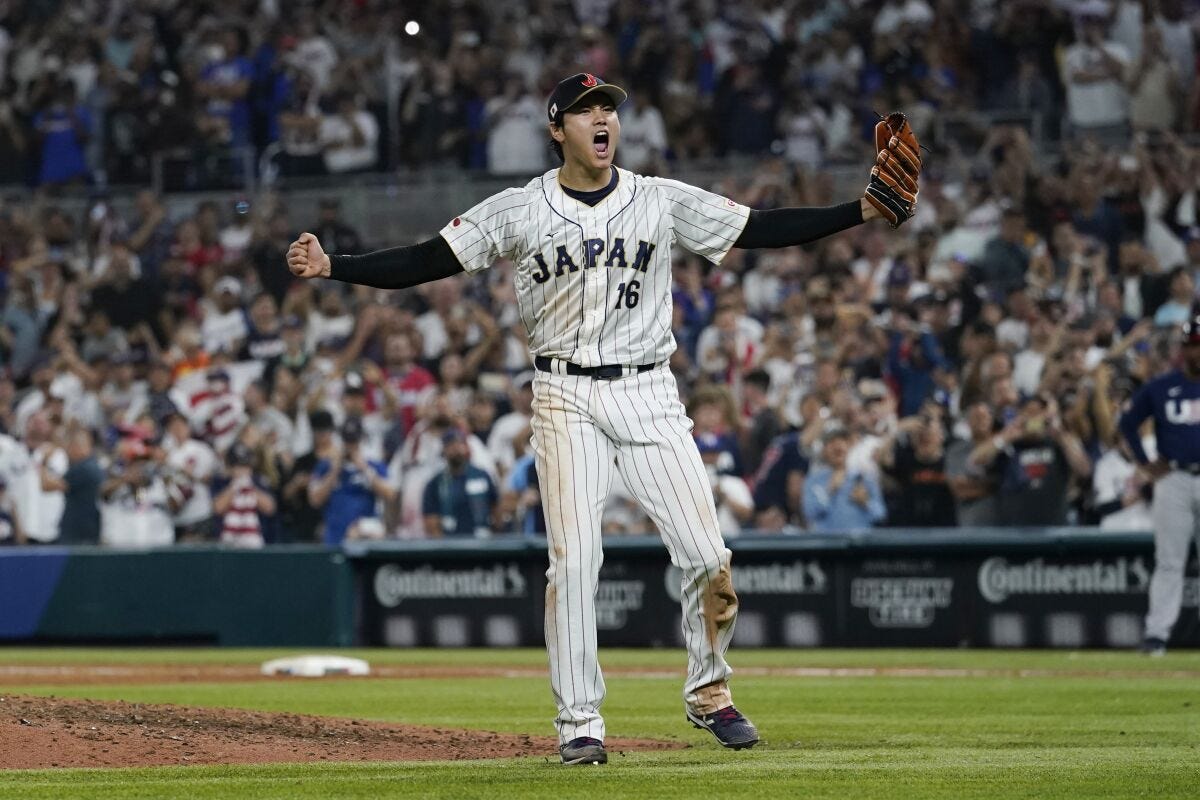Fighting US Hegemony at the World Baseball Classic
Right before Shohei Ohtani delivered the first pitch to Mike Trout in the last at-bat of the World Baseball Classic, Joe Davis called it “the dream matchup.” Usually announcers call things “dreams” when they mean that someone has been looking forward to it, but this felt dream-like in a more literal way: hazy and unreal and hard to believe, like it had been willed into existence by the collective subconscious of every baseball fan.
Here were these two teammates, whose talent has defined baseball for more than a decade* and yet who have somehow never really played a high-profile MLB game between them, now facing each other with two outs in the ninth inning of a one-run game, in the biggest at-bat of the year… in Miami… in March. As thrilling as it was, the outcome of the at-bat seemed less important than the fact that it was happening at all.
*Trout finished in the top two in AL MVP voting seven times in the eight seasons between 2012 and 2019; Ohtani did it each of the last two years. The last time there was an MVP race without one of these two in the running was 2011.
The World Baseball Classic has been a weird creature since the inaugural tournament back in 2006. In some ways, its existence is an overdue recognition of how international a game baseball has become.* On the other hand, I’ve written before about my ambivalence towards international sporting events, and the WBC in particular has always struck me as a transparent cash grab and a blatant attempt to rip off the FIFA World Cup. So even though I’m never going to quibble with more baseball, I can’t say I ever really got into it before this year.
*Although part of what I find weird about the WBC is that baseball is not THAT international. The five WBC’s have only seen three different winners and nine different semifinalists; the last five World Cups, by contrast, have had five different winners and 12 different semifinalists. There are certainly countries where baseball is incredibly popular, but it’s not exactly a global game. And it’s kind of hard to predict which countries have significant baseball cultures.
Soccer’s popularity at least tends to follow European imperial patterns, but baseball’s is more confusing. It has something to do with climate, but that doesn’t explain it all; countries in Central and South America that border each other often have very different levels of baseball enthusiasm. It also has something to do with the Cold War: Baseball never made much of a dent in Russia or China. But on the other hand, Cuba and Venezuela are HUGE baseball countries. So who really knows?
And it seems I’m not the only one who finds it a little gimmicky. When Mets closer Edwin Díaz hurt himself during the celebration of Puerto Rico’s victory over the Dominican Republic, the reaction among a lot of (typically white American) fans was that he shouldn’t have even been playing. Probably the most notable example was a stupid tweet from that idiotic loudmouth Keith Olbermann, who suggested the whole tournament was a stupid exercise in dividing players up based on “where their grandmothers got laid.”


He walked that back a little when people pointed out how offensive that was, but I think it’s worth taking his question seriously. Why DO players care so much about this tournament? Because they really seemed to — multiple players at the WBC compared it to the World Series, with one even saying that he would have paid money to play in it.
On one level, the explanation is obvious: Players (and people in general) like playing for something bigger than money. Capitalists often forget this because it is so crucial to capitalist ideology that money is the only way to motivate people. Indeed, one common way of dismissing socialism is to insist that greed is the only way to get people to work.
This has always struck me as incredibly myopic — a condescending axiom that sounds honest just because it is cynical. Have the people who say this ever met actual workers? Money can motivate people to do the bare minimum, but if you really want people to work hard, you have to get them to believe in what they are doing. What really motivates people is some higher cause,* and playing for your country is an obvious one. Díaz is loyal to the Mets because Steve Cohen signs his checks — he’s loyal to Puerto Rico because of who he is.
*To be clear, I am NOT saying money doesn’t motivate people. Obviously it does, especially on the macro level: Part of why society is awash in useless startups while also experiencing a major nursing shortage is that the former field is far more lucrative than the latter. But, on an individual level, the people doing those jobs still need to tell themselves a story about why what they’re doing matters. The Silicon Valley language about “making the world a better place” is no accident.
Personally, as a socialist, I don’t love this. Nationalism is generally just a tool of oppression used by the international capitalist class. I would much prefer if Edwin Díaz’s higher cause was loyalty to the workers of the world. But there is still something gross about the implication that having loyalty to anyone but his boss is some kind of betrayal.
Which brings us to the second component of all this: the hegemonic power of the US. Because it’s no accident that virtually all the biggest stars at the WBC — whether it was Shohei Ohtani for Japan or Edwin Díaz for Puerto Rico or Randy Arozarena of Mexico — get their paychecks in the United States. That’s where the money is, so that’s where all the best players go. For one, it’s where they can maximize their earning potential,* but it’s also seen as the highest level of competition. All that money vacuums up all the prestige and talent from around the world.
*The highest paid baseball player in Japan makes a little under $6 million. Shohei Ohtani’s salary in 2023 will be $30 million. He also reportedly doubles that via endorsements, and will likely make significantly more when he reaches free agency next year.
So it’s not just that the World Baseball Classic offers players an opportunity to represent their country — it offers them an opportunity to represent countries they’ve had to abandon for economic reasons. People — and not just baseball players, but workers of all kinds — immigrate to the United States because of the country’s economic might (an economic might that is, by the way, sustained via all sorts of immoral, illegal, and deadly means), but that doesn’t mean they give up their allegiance to their home country. In fact, it might make it stronger; they might RESENT the fact that they have to leave their homes and travel somewhere where they don’t speak the language and aren’t familiar with the culture just to reach the top of their craft. In that light, they might ENJOY sticking it to the US.
This is something that Americans don’t always understand, and when Olbermann refers to countries “where their grandmothers got laid,” he is illustrating his confusion about this. It seems strange to him that a player who lives and works in one country might represent another. And, indeed, the WBC does feature some odd allegiances. Freddie Freeman, who was born and raised in Orange County California, played for Canada. Matt Harvey, who grew up in Connecticut, played for Italy. Tommy Edman, who was born in Michigan and grew up in San Diego, played for South Korea. The Cuban team featured at least four players who defected from Cuba.
Some of this, no doubt, is that non-US teams are easier to make since they aren’t as overstuffed with talent. But it also suggests that people can have national loyalties to nations they don’t live in, even ones they’ve never lived in. Nationalism can become a creed of resistance, a way of pushing back against the overwhelming force exerted by the US around the globe. It is, I think, a very dangerous and misguided form of resistance, but one that needs to be reckoned with all the same.



